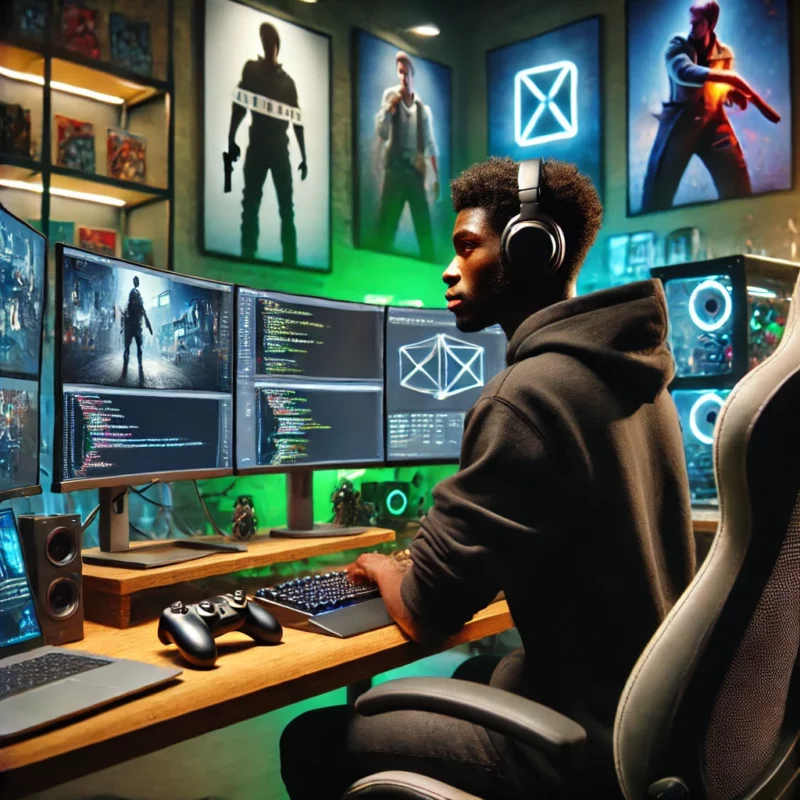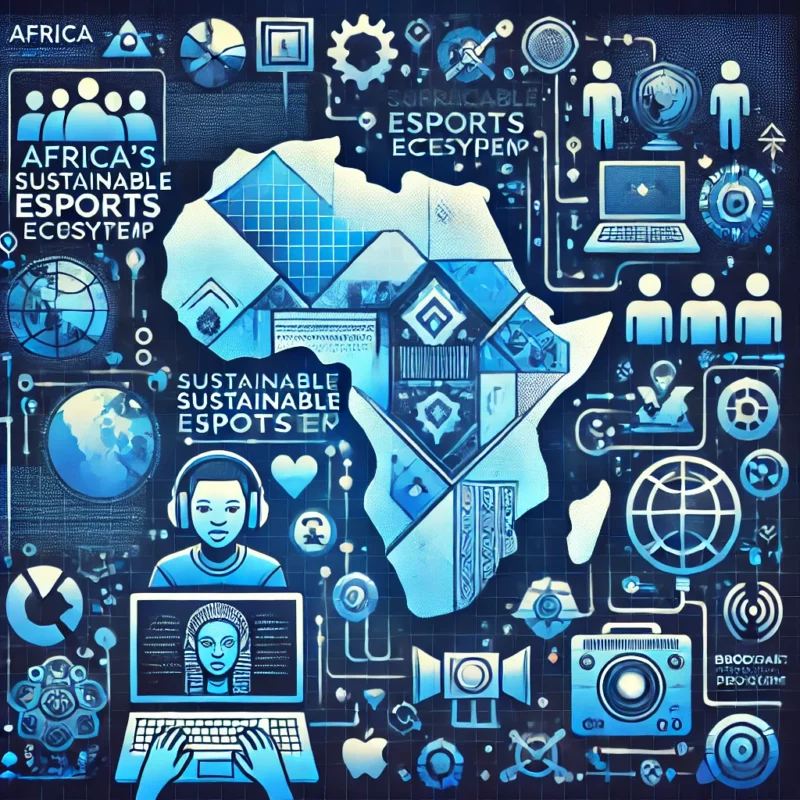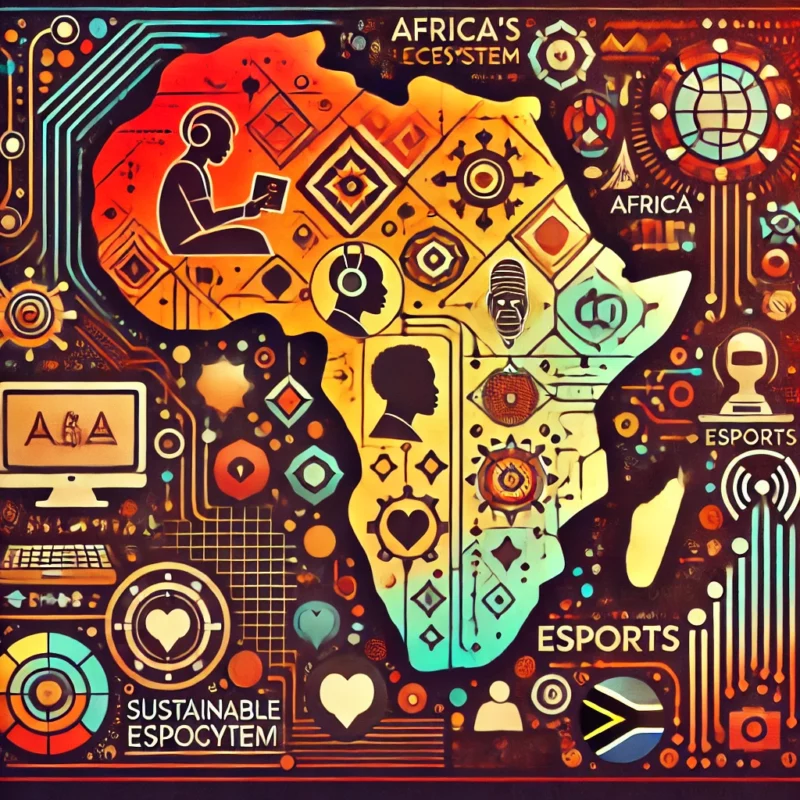By Paul Bakare…
Africa’s video gaming scene is on the brink of a digital revolution as the industry’s revenues and valuations are expected to grow yearly by double-digit percentages. With a young, mobile-first population and a rich cultural heritage, the continent is poised to become a major force in global esports.
Building a sustainable esports culture in Africa means nurturing every link in the value chain—from creating games and fostering gameplay to building vibrant communities, organizing competitions, and delivering world-class esports production. Selecting and nurturing the right game titles—whether developed locally or embraced from international markets—is essential at every stage.
A unique aspect of this ecosystem is that game developers play a pivotal role across all segments. They not only create culturally resonant content but also continuously improve gameplay, integrate community features, and help shape competitive formats and esports production. In Africa, popular game titles such as PUBG Mobile, Free Fire, Call of Duty Mobile, and FIFA Mobile dominate mobile gaming in markets like Nigeria, Kenya, and South Africa, while PC titles like League of Legends and CS:GO also have dedicated followings. At the same time, homegrown titles like Aurion: Legacy of the Kori-Odan showcase Africa’s potential for local game development.
Below is a comprehensive, easy-to-follow guide on building a sustainable African esports culture, outlining each segment, the roles of key stakeholders, strategies for community building (with a special focus on competition and esports production), and monetization approaches—illustrated with relevant game titles for the African market.
1. Game Development: The Foundation of the Ecosystem

What It Means:
Game development is the starting point of Africa’s esports journey. It involves creating or selecting game titles that reflect local stories, art, and cultural heritage while providing employment opportunities and fostering ownership of intellectual property.
Key Stakeholders & Their Roles:
- Game Developers & Studios:
- Role Across Segments: Develop culturally resonant titles or adapt international titles to local tastes. Their work influences gameplay, inspires community discussions and sets the stage for competitive play and esports production.
- Example: Homegrown games like Aurion: Legacy of the Kori-Odan set a benchmark for integrating African folklore and art into gaming.
- Investors & Incubators:
- Role: Provide funding and mentorship to ensure local studios can create high-quality, marketable games.
- Educational Institutions:
- Role: Train aspiring game designers and programmers, blending modern technology with local creativity.
Monetization:
- Revenue through game sales, DLCs, in-game purchases, and cross-media licensing (films, merchandise).
End Goals:
- Cultivate local IP that resonates globally.
- Establish Africa as a hub for innovative game development and cultural storytelling.
2. Gameplay: Building a Skilled and Expansive Player Base
What It Means:
Gameplay is the heart of the ecosystem—where players interact with games. It’s about expanding the player base, enhancing skills, and fostering a culture of continuous learning.
Key Stakeholders & Their Roles:
- Gamers/Players:
- Role: They are the core audience whose active participation fuels every segment.
- Popular Titles in Africa: Mobile games like PUBG Mobile, Free Fire, Call of Duty Mobile, and FIFA Mobile are widely played in Nigeria, Kenya, and South Africa; PC titles like League of Legends and CS:GO attract competitive players.
- Coaching Organizations & Training Academies:
- Role: Provide tutorials, mentorship, and structured training programs to elevate skills.
- Game Developers:
- Cross-Segment Role: Continuously refine gameplay mechanics through updates and patches, integrating player feedback.
- Local Leagues & Grassroots Organizers:
- Role: Organize tournaments and friendly competitions that build skills and camaraderie.
Monetization:
- Through in-game purchases, premium memberships, and coaching fees.
End Goals:
- Build a large, skilled, and engaged player base.
- Create clear pathways for amateurs to progress into competitive players.
3. Communities: The Social and Cultural Backbone

What It Means:
Gaming communities are the spaces where players connect, share experiences, and build a cultural identity. For African audiences, communities must reflect local languages, traditions, and social networks, blending online and offline experiences.
Key Stakeholders & Their Roles:
- Community Organizers & Moderators:
- Role: Establish and nurture vibrant online and offline spaces (e.g., Discord channels, WhatsApp groups, local Facebook pages) where gamers interact.
- Content Creators & Influencers:
- Role: Produce engaging content—videos, live streams, fan art—that builds local gaming culture and spreads African gaming narratives.
- Game Developers:
- Cross-Segment Role: Integrate community features into games and support platforms that facilitate social interaction.
- Local Event Planners & Cultural Institutions:
- Role: Organize meetups, tournaments, and culturally themed events that celebrate local heritage.
Building Communities for African Audiences:
- Local Language & Cultural Relevance: Encourage dialogue in indigenous languages and incorporate local symbols, art, and storytelling.
- Hybrid Engagement: Blend online forums with offline events such as local tournaments, gaming cafes, and community workshops.
- Content-Driven Culture: Promote initiatives like fan art contests and highlight reels that resonate with local traditions.
Popular Titles That Build Communities:
- Mobile games like Free Fire, Mobile Legends Bang Bang and FIFA Mobile and custom African titles can generate strong community engagement, while titles like League of Legends and CS:GO support dedicated competitive communities.
Monetization:
- Advertising, sponsored posts, membership subscriptions, and crowdfunding for exclusive events.
End Goals:
- Develop a strong, culturally vibrant community that drives sustained engagement and content creation.
- Build a sense of local pride and identity around African gaming culture.
4. Competition: Fostering Talent and Building Professional Esports
What It Means:
Competition is where raw talent is identified, nurtured, and showcased. It involves structured tournaments and leagues that turn skilled gameplay into professional opportunities.
Key Stakeholders & Their Roles:
- Esports Organizations & Regulatory Associations:
- Role: Establish and manage official leagues and tournaments with fair play rules.
- Esports Teams & Professional Players:
- Role: Compete at high levels, representing African talent on regional and international stages.
- Esports teams can also foster community growth by hosting events and engaging fans, nurture talent through structured training and mentorship, and sustain audience interest with compelling narratives, loyalty programs, and interactive experiences.
- Talent Scouts & Coaches:
- Role: Identify emerging talent and provide training programs for development.
- Game Developers:
- Cross-Segment Role: Optimize games for competitive play and support dedicated competitive modes.
Building Communities for Competition:
- Local and Regional Leagues: Organize grassroots tournaments that lead to national championships.
- Talent Development Programs: Run academies and training camps focused on competitive titles like League of Legends, EA FC, Call of Duty Mobile, and PUBG Mobile.
- Regulatory Frameworks: Establish regional associations to standardize competition rules and nurture professionalism.
Popular Titles for Competition in Africa:
- League of Legends, CS:GO, PUBG Mobile, Free Fire, Mobile Legends, EA FC and Call of Duty Mobile are integral to competitive gaming on the continent.
Monetization:
- Sponsorships, prize pools, broadcasting rights, and merchandise sales.
End Goals:
- Develop a sustainable competitive ecosystem that nurtures talent from grassroots to professional levels.
- Position Africa as a rising power in global esports.

5. Esports Production: Delivering World-Class Entertainment
What It Means:
Esports production transforms competitive play into polished, high-quality entertainment. It involves live broadcasts, highlight reels, and behind-the-scenes content that captivates audiences.
Key Stakeholders & Their Roles:
- Production Companies & Event Organizers:
- Role: Manage and produce live events with professional quality.
- Streaming Platforms & Media Outlets:
- Role: Broadcast events to reach audiences both locally and globally.
- Sponsors & Advertisers:
- Role: Fund events and secure partnerships to boost production quality.
- Content Creators:
- Role: Provide commentary, analysis, and creative content that enriches the viewer experience.
- Game Developers:
- Cross-Segment Role: Collaborate on esports-specific modes, in-game events, and integrations that enhance the spectacle.
Building Communities for Esports Production:
- Local Broadcast Hubs: Develop production facilities within Africa to create professional esports content.
- Collaborative Platforms: Utilize social media, YouTube channels, and streaming services to build an engaged audience around African esports events.
- Interactive Fan Engagement: Incorporate live polls, chat rooms, and behind-the-scenes streams to make fans feel involved in the production process.
Popular Titles for Esports Production in Africa:
- League of Legends, EA FC, and mobile titles like Call of Duty Mobile, Mobile Legends and PUBG Mobile are frequently featured in major African esports events.
Monetization:
- Through advertising, sponsorships, pay-per-view models, subscription services, and merchandising.
End Goals:
- Elevate African esports production to international standards.
- Create diverse content that engages both hardcore esports fans and casual viewers.
6. The Unique African Advantage
Africa’s gaming ecosystem holds distinctive strengths:
- Youthful, Mobile-First Demography: A large, young population drives growth on mobile platforms, making titles like PUBG Mobile, Free Fire, Call of Duty Mobile, and FIFA Mobile especially popular in countries such as Nigeria, Kenya, and South Africa.
- Rich Cultural Heritage: Local stories, art, and traditions provide a unique foundation for culturally resonant games and community events.
- Emerging Digital Infrastructure: Rapid improvements in internet connectivity and mobile technology pave the way for robust online play and streaming.
- Economic Opportunity and Innovation: With targeted investments, Africa can generate significant employment and become a global hub for gaming and esports innovation.
7. Bringing It All Together: A Sustainable Value Chain

Building a sustainable esports culture in Africa means connecting all these segments into a cohesive ecosystem:
- Raw Content Creation:
- Game development produces culturally relevant games, whether homegrown or selected international titles that resonate with local audiences.
- Player Engagement & Skill Building:
- Gameplay expands the player base and enhances skills, supported by coaching programs and grassroots tournaments.
- Community Formation:
- Strong communities—tailored for African audiences through local languages and cultural events—serve as the social and cultural backbone.
- Structured Competition:
- Official tournaments and leagues nurture talent and create clear pathways from amateur to professional levels.
- High-Quality Esports Production:
- Professional broadcasting and diverse content formats elevate competitions, reaching global audiences.
- Monetization Across Segments:
- Revenue streams—game sales, in-game purchases, sponsorships, advertising, streaming, and merchandise—reinforce and reinvest in the ecosystem.
Throughout this value chain, game developers play a central, cross-cutting role—continuously improving gameplay, integrating community features, and collaborating on competitive formats and esports production.
Conclusion: The Future of African Esports
Africa stands on the cusp of a digital transformation in gaming. By investing in local game development, nurturing player skills, building culturally vibrant communities, establishing structured competitive ecosystems, and producing world-class esports content, the continent can build a sustainable and dynamic esports culture. Each segment of the value chain, supported by strategic monetization, drives economic growth, cultural pride, and global influence.
With Africa’s unique demographic strengths, rich cultural heritage, and rapidly evolving digital infrastructure, there is a tremendous opportunity to redefine the global esports landscape. What steps will your organization take to harness this potential and build Africa’s next generation of esports champions?
This article continues an Analogy on “Navigating The Political Landscape of Video Games”… Below are references to previous articles in this series
- Why Game Modes Are Better for Olympics in Esports, Not Games
- Navigating The Political Landscape of Video Games: Part 2 – A Culture-Driven Strategy for Building Gaming Audiences
- Navigating the Political Landscape of Games: An Analogy to World Structure by Paul Bakare
Last Updated on March 8, 2025









I’m ready for this transformation.
#Esports_Africa
#LeagueofLegends_Africa